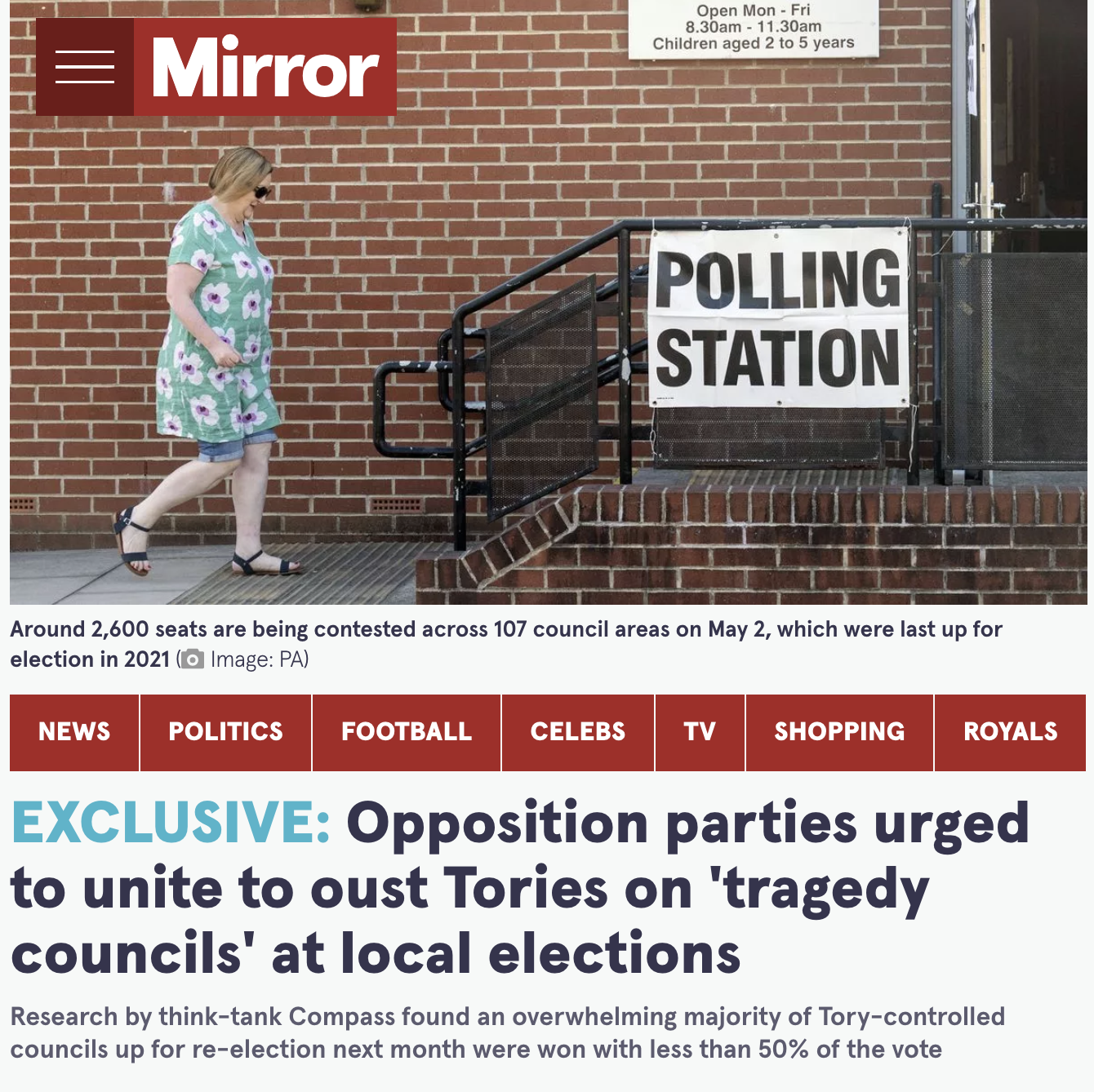Compass launched its local elections campaign this week with new research in the Mirror that revealed the shocking democratic deficit at the heart of Tory-run councils across the country.
A staggering 83% of the Conservative majority-run councils up for election this May were won with a minority share of the popular vote the last time they were contested, Compass has revealed in a new publication, Over the Party Wall. In light of these statistics, Compass is urging Labour, Liberal Democrats and Greens to work together in order to better represent the progressive majority and lock the Conservatives out of power.
The local elections on May 2 will see millions of voters across the country go to the polls in what could be the last major test of public opinion before the next general election, expected this autumn.
You can see where has council elections and who currently controls those councils here:
There are 107 councils facing re-election this May, 18 of which are majority-controlled by the Conservatives. But the Tories won 15 of these councils with less than 50% of the vote the last time they were contested. That means more than half of voters cast their ballots for parties other than the Conservatives, but the Tories still won a majority of the seats – and all of the power. On these 15 councils, the Conservatives won, on average, 59.9% of the seats with just 45.9% of the popular vote – an average democratic deficit of 14.1%. Compass labels these councils ‘tragedy councils’ because greater collaboration between progressive parties in these areas could have prevented the Tories from seizing control in a large number of them. The underlying progressive majority in these key areas also means the Tories will be extremely vulnerable to tactical voting and local cooperation between progressive parties this May.
The 15 ‘tragedy councils’ are:
- North East Lincolnshire
- Thurrock
- Basildon
- Epping Forest
- Harlow
- Rushmoor
- Havant
- Reigate and Banstead
- Adur
- Dorset
- Gloucester
- Walsall
- Solihull
- Dudley
- Redditch
The Tories are braced for a battering at the local elections, with some pollsters suggesting the party could lose up to half of its seats. But as Compass’ research shows, our FPTP voting system advantages the Conservatives and could still massively limit the scale of any defeat they face this time around. This is because it punishes the fractured progressive vote and too often hands victory to the Tories against the wishes of the majority.
But if our progressive parties and their supporters can work together, we can begin to practise a more hopeful way of doing politics – one where we don’t divide while the Conservatives conquer. We believe in cooperation among progressives, not just because it’s the way to win – but because it’s how we want to win. By working together we can deliver bigger answers, better government and a broader political reach than any one party alone can muster.
Of the councils facing re-election in May, 15 are progressive partnerships or coalitions. These councils are excellent examples of progressive cooperation in practice, and represent the pluralistic nature of communities across the country.
These councils are:
- Brentwood
- Rochford
- North Hertfordshire
- Welwyn Hatfield
- Pendle
- Milton Keynes
- Basingstoke and Deane
- Hart
- Tunbridge Wells
- West Oxfordshire
- Elmbridge
- Tandridge
- Stroud
- Cannock Chase
- Worcester
Progressives in these councils are collaborating with one another to keep theConservatives out of power, and Compass activists are working tirelessly to make sure the local elections produce more of these vital cooperative arrangements. Compass has more than 30 active local groups across the country, many of which are performing critically important roles in bringing our progressive parties together.
Cross-party working must now take centre stage to create a winning coalition that can transform our politics. We must Win As One.

